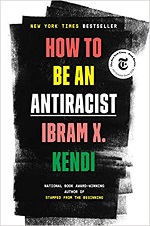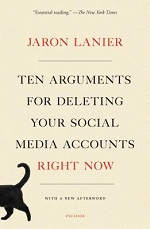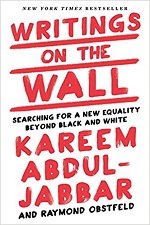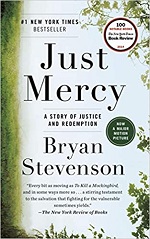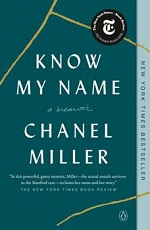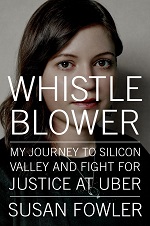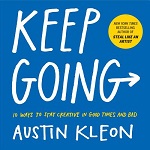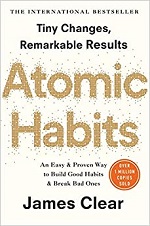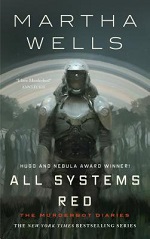Top reads for 2020
In no particular order, these are some of my favorite books that I read in 2020.
~ ~ ~
How to Be an Antiracist, by Ibram X. Kendi, is the most important book I read this year. It was also the most difficult for me to grasp and embrace. For both these reasons, I’m reading it again (Dec. 2020).
The concepts make sense, Kendi explains them clearly, and I truly appreciate how he uses his own life experiences as thorough and detailed examples. My trouble comes from fifty years of social conditioning being turned on its head. I was raised with the phrase “not racist,” among many others I’ve since accepted as racist. Not until reading Kendi’s book did I begin to understand how “not racist” belongs in the “racist” category. It took some mental heavy-lifting for me to get there.
The simplest way I can explain my understanding is that claiming to be “not racist” means you’re not taking any actions against racism, which supports the current systems that are built on racist ideas and constructs (in the U.S.). By doing nothing, you’re complicit in the racist laws and system, hence doing nothing falls into the “racist” category.
Those who are antiracist actively oppose racist policies, laws, and systems through various means (such as voting against racist laws, donating to organizations that fight racist systems, or supporting businesses that have created antiracist business models).
Read it with an open mind.
~ ~ ~
I’ve been an avid user of social media for well over a decade now. As an introvert, social media has played a huge role in allowing me to interact with my friends (both real-life and online-only) in ways that work well for me. Combining it with in-person interactions, I was able to build better relationships with several of my friends and co-workers.
After reading this book, I had to pick my jaw up off the floor. It gave me a whole new perspective on social media, how it impacts our lives, and, perhaps more importantly, our society. Lanier takes the reader on a journey through ten arguments that become increasingly concerning and scary. By the end, I was damn close to pulling the plug on all of my accounts.
Instead, I drastically reduced my time on social media and even modified how I used it to minimize some of the negative behaviors I was exhibiting and feeling. And that worked, I felt better about how I was using my time and my attitude improved. My original intention was to reconsider quitting all-together after six months of the new behaviors. Then a global pandemic happened and I was no longer spending time with people in real life, so I started using again.
Honestly, I need to read this again. At 162 pages, it doesn’t take long to get through and I’d like to mull over Lainer’s reasoning again.
The primary reason this book is one of my top reads for the year is because of the different perspective it gave me on social media. Even if I haven’t quit (yet?), I’m now much more aware of how I use it, how it impacts my mental/emotional health, the impact I can have on others, and all my data that the companies are collecting, using, and reselling for profit. The book is worth reading for that eye-opening process alone.
For the curious, the 10 arguments (also clearly available on the back cover of the book):
- You are losing your free will.
- Quitting social media is the most finely targeted way to resist the insanity of our times.
- Social media is making you into an asshole.
- Social media is undermining the truth.
- Social media is making what you say meaningless.
- Social media is destroying your capacity for empathy.
- Social media is making you unhappy.
- Social media doesn’t want you to have economic dignity.
- Social media is making politics impossible.
- Social media hates your soul.
Lanier also introduces the acronym BUMMER, which stands for Behavior of Users Modified, and Made into an Empire for Rent. He’s not wrong.
For a thorough and thoughtful review of the book, see David Wineberg’s on Goodreads.
~ ~ ~
I’ve known for a while now that Kareem Abdul-Jabbar is a historian, philosopher, and writer…three things I enjoy. Even then, I wasn’t expecting this book to be one of my favorite books for the year. What I really like is that he approaches difficult and complex topics from a historical perspective with succinctness and clarity, ending each chapter with calls to action. And the final chapter is written as a letter to Gen Z, encouraging them to deal with the seemingly endless worldwide problems facing them one day at a time, just as previous generations have done. As a Gen X’er, I found it relatable and full of empathy, hopefully the Gen Z’ers who read it feel similarly.
After finishing the book, it struck me how it’s a great primer for understanding inequity with regard to each of the subjects he discusses: politics, racism, religion, gender, class struggle, sports, news media, and seniors. Additionally, he ends each chapter with concrete suggestions of what we can do to mend these usually systemic issues. Anyone who wants to understand more and then take action on such a broad array of issues will be well-served reading Abdul-Jabbar’s Writings on the Wall.
Passionate defense of bad logic is the main cause of most of the world’s misery.
~ ~ ~
This was an interesting, insightful, and often sad memoir. The stories of several incarcerated people are woven into Walter McMillian’s novel-length tale of injustices. Stevenson brings awareness to and discusses in a fair amount of depth the multitude of ways that our justice system is unfair, uncaring, and corrupt. This should be required reading, especially for anyone interested in how the laws are interpreted and implemented in our racially charged country.
~ ~ ~
Chanel Miller’s story is heart-wrenching and insightful. Chanel is a descriptive writer, providing intimate details about her experiences throughout the whole timeline. The dichotomy of how she saw herself (Emily Doe vs. Chanel Miller) is especially telling and probably experienced by other victims. There are so many ways our society, healthcare, and legal systems are failing victims. It’s horrible that victims are regularly subjected to the ineptitude of our bureaucratic justice system.
Another one that should be required reading, especially for anyone who’s ever questioned a victim’s honesty, for whatever reason.
~ ~ ~
I thoroughly enjoyed Susan Fowler’s memoir and story of her experience at Uber. The first third of the book describes her childhood and time attending university. This provides insights into her character and motivations to do the right thing, like blow the whistle on a toxic billion dollar company.
Unknown to those of us who read her original blog post (Reflections on one very, very strange year at Uber), she had overcome several hurdles during her life before Uber; including harassment (sexual and otherwise) while studying philosophy and physics at Penn.
As someone who has recently started learning about stoicism and using the ideology to ground myself, I’m impressed with how she was able to do just that to get through exceedingly tough times in her life. She references the Stoics several times throughout the book and how she relied on some of the ideas during her most challenging moments. It’s a testament to the power of her beliefs that she was able to rebuild her trust in and compassion for herself, even while being bullied and gaslighted by her managers.
The words of the Stoics reinforced what I already knew: I couldn’t control what others did to me, but I could control how I reacted.
~ ~ ~
The title of this book as well as the content embraces my personal mantra–keep moving forward. This is a short but powerful book! It only took me an hour to read, yet I came away infused with energy to create and invigorated to make stuff! This is going into my annual to-read rotation, a powerful reminder that we need to create in order to truly appreciate that which we consume (and life, in general).
~ ~ ~
An exciting story with some unique twists and amazing art, well worth reading (more than once). Book One: Opening Fire and Book Two: Force Multiplied are currently available, with Book 3 expected someday.
If you’ve watched the movie on Netflix (which I recommend), know that it follows the graphic novel fairly close. Greg Rucka wrote the screenplay and required much of the original material remain as originally written (spoilers herein).
~ ~ ~
I’ve read a handful of motivational books over the years, looking for pragmatic suggestions that fit into everyday life and Atomic Habits delivered. The author suggests creating a system that supports the habits you want to cultivate. Clear doesn’t prescribe a specific system for you to follow, rather provides practical methods for incorporating them into your life where they fit.
Perhaps it’s my background in accounting, but it really struck a chord when Clear compared daily habits to compound interest. Similar to saving a small amount every day, daily habits don’t feel or look like much after a week or month. The impact might only become apparent after a year or longer, such as with eating healthy or exercising.
The key to mastering a habit is repetition, not perfection. Make the time to do it, stick to that time each day, and show up. Don’t pressure yourself to do it perfectly or for longer than you want to, just showing up is what counts. Accept that some days will be better than others and that’s what you’re building on, the good days. Meanwhile, the bad days serve a purpose; they prevent you from backsliding and losing progress. They don’t need to be perfect but they need to happen.
As far as pragmatic suggestions, here are the ones that stood out to me:
- Create a system, not goals.
- Make it as easy as possible, reduce the friction.
- State your intentions out loud.
- Stack a new habit with an existing one.
- Redesign your environment to make the cues for your preferred habits more obvious and attractive.
~ ~ ~
Who knew that a sarcastic, self-aware security robot on a journey of discovery would be what I needed during a world pandemic. It was. This series of mostly novella-length books is funny, sardonic, packed with action, and even some self-reflection (from the perspective of a security bot questioning its purpose in life). The Murderbot Diaries were exactly the humor I needed to get through the end of 2020. The series so far, in order:
- Murderbot Diaries (Book 1): All Systems Red
- Murderbot Diaries (Book 2): Artificial Condition
- Murderbot Diaries (Book 3): Rogue Protocol
- Murderbot Diaries (Book 4): Exit Strategy
- Murderbot Diaries (Book 4.5): Home: Habitat, Range, Niche, Territory (available for free here)
- Murderbot Diaries (Book 5): Network Effect (first part of the mission that’s concluded in System Collapse)
- Murderbot Diaries (Book 6): Fugitive Telemetry (flashback story that interrupts the mission encompassed in Network Effect and System Collapse)
- Murderbot Diaries (Book 7): System Collapse (second part and conclusion of the mission started in Network Effect)
I enjoyed Nataliya’s reviews: All Systems Red, Artificial Condition, Rogue Protocol, Exit Strategy, Home, Network Effect, Fugitive Telemetry, and System Collapse.
~ ~ ~
